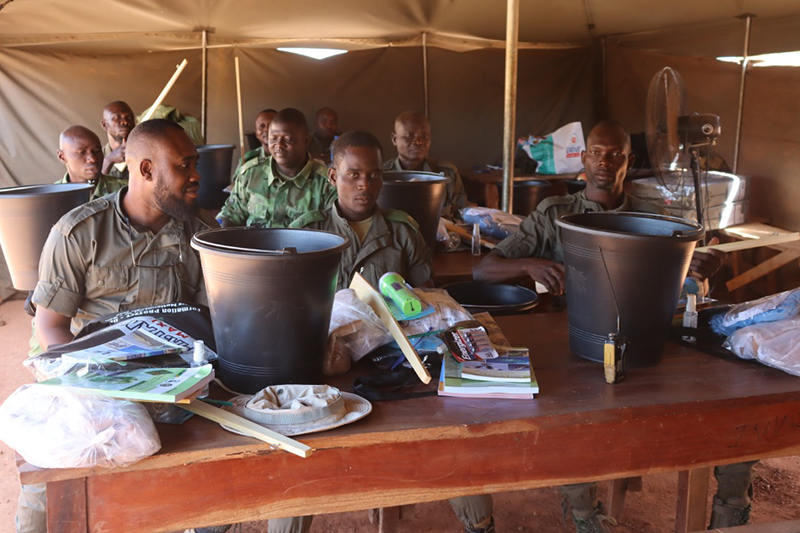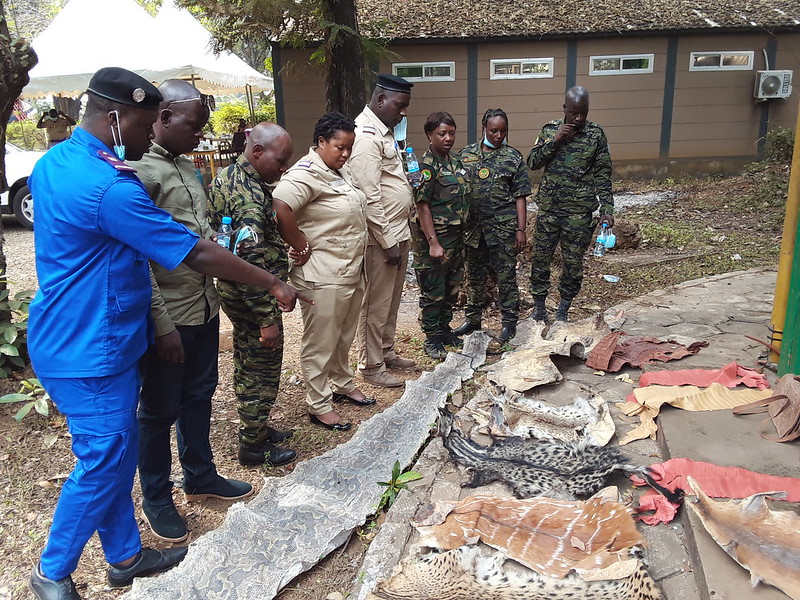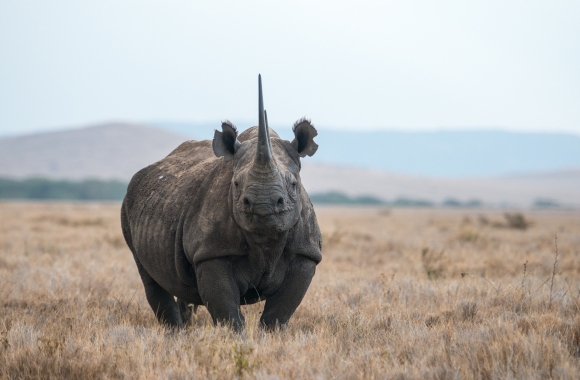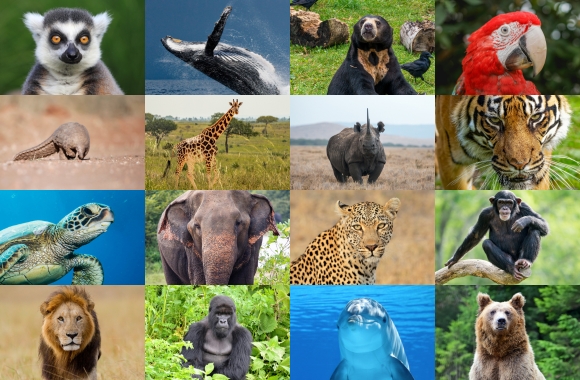Our enforcement support projects include, but are not limited to, the following: (click “EXPAND” to read more.)
Training on Shark Identification and CITES Implementation Workshop to Implement the Dakar Action Plan
Born Free organized and delivered a regional training on the implementation of the CITES listings of shark and ray species held in Dakar, Senegal in 2016. The purpose of this training was to strengthen the CITES enforcement capacity of national authorities working in coastal West and Central African countries. These efforts to implement the Dakar Declaration led to the adoption of priority recommendations on how to stop trafficking in shark and ray species in the region. These trainings took place as detailed in this table:
Training on Shark and Ray Species in Benin, The Gambia, Ghana, Guinea, Guinea-Bissau, Côte d’Ivoire, Liberia, Senegal, Sierra Leone, and Togo
Born Free organized and facilitated trainings on the identification of CITES-listed shark and ray species in Benin, The Gambia, Ghana, Guinea, Guinea-Bissau, Côte d’Ivoire, Liberia, Senegal, Sierra Leone, and Togo, working in collaboration with the U.S. National Oceanic and Atmospheric Administration (NOAA) fisheries. Born Free USA also collaborated with the West Africa Sub-Regional Fisheries Commission to develop training resources and documents, and facilitated coordination between NOAA, the training team, and national authorities.
These trainings took place as detailed in this table:
CITES Train-the-Trainer Course for Customs Officers
The Convention on International Trade in Endangered Species of Wild Fauna and Flora (CITES) requires that international trade in protected species be authorized through a permitting system. In order for international trade to be legal under CITES, the issuance of valid CITES permits and certificates, and control of these documents at the border, are necessary. Requirements on the issuance of CITES permits vary depending on the listing of the species in Appendix I, II, or III.
Customs and enforcement officers at the border play a vital role in CITES enforcement. Their role includes, among other duties, identifying CITES specimens to detect illegal trade, inspecting shipments and checking the validity of CITES documents, seizing illegal specimens, and ensuring that live animals are transported in accordance with applicable welfare standards.
The complex and technical nature of CITES rules, combined with the lack of programs targeting wildlife crime in this region, resulted in a critical lack of knowledge about CITES among wildlife authorities and law enforcement officers. Customs and police officers working in wildlife trafficking hotspots, including those in West and Central Africa, are very rarely trained to adequately fight against highly organized wildlife traffickers. Born Free USA has therefore developed a CITES enforcement training program tailored to the needs of countries in that region.
These trainings aimed to achieve three primary goals:
- Provide participants with the skills they need to train their colleagues/agencies once they return to their countries;
- Provide participants with the opportunity to practice their training skills in a classroom setting with practical exercises; and
- Provide participants with the opportunity to interact with colleagues from other countries, with the goal of forming a CITES enforcement training network and develop best practices across the region.
Moreover, trainings held in Ghana, Benin, and Senegal also included additional training on CITES-listed shark and ray species, shark trade, and value of trade in West Africa and globally, as well as the outcomes of regional needs assessment for marine species, delivered in collaboration with West Africa Sub-Regional Fisheries Commission.
After assessing needs, we work with the authorities of each country to define training objectives, which prioritize education through a train-the-trainer approach. Our primary goal is to support countries by giving them the ability to repeat trainings at the national level based on their most urgent priorities. We aim to ensure that the training team we use is composed of peers with in-depth knowledge about CITES enforcement and significant field experience. We also prioritize practical exercises, “on the job” training, and site visits (e.g., on-site trainings, hands-on manipulation of CITES specimens by trainees to demonstrate understanding of species identification techniques, having trainees check illegal permits to practice detection of fraudulent permits, having trainees demonstrate the ability to use the CITES identification manual, and other identification resources).
These trainings for customs officers were organized from 2018 to 2020 in Cameroon (in collaboration with the Garoua School of Fauna and with the U.S. Fish and Wildlife Service), Senegal, Benin, Ghana, Nigeria, Niger, and Liberia, as detailed below:
“The workshop has raised my confidence level in handling CITES issues.”
“With the training manual I have been able to develop a PowerPoint presentation to teach.”
– Ghana Customs Officials
“The workshop achieved the objectives because as customs staff, we learnt additional or new information with regards to CITES and Forestry Development Authority’s terms of reference. The authority legislation was an added advantage.”
– Liberia Customs Official
Customs Follow-up: National Customs Trainings Led by Trained Customs Officials
Customs officers from Côte d’Ivoire, Benin, Ghana, Togo, and Guinea who were trained during the CITES train-the-trainer workshops for customs officers were selected to organize follow-up trainings for customs officers in their respective countries. These trainings took place as detailed in this table:
Training Judges and Prosecutors
The purpose of this training is to train judiciary members on what CITES is, their role in implementing CITES, and what tools exist for enforcement purposes. This training provided participants with the necessary tools to recognize the chain of organized criminal activity and understand international legislation and procedures in place to complete an organized crime investigation. There were also practical activities that helped officials recognize CITES regulated species. This helps countries support CITES management authorities in implementing countries’ obligations to stop wildlife crime.
Born Free USA organized four training courses for judges and prosecutors in 2019-2020, as detailed in this table:
In Depth:
- The manual on Mutual Legal Assistance, produced in English and in French
- Blog Post: Training in Ivory Coast to Counter Wildlife Crime
- Blog Post: Strengthening Wildlife Law Enforcement Capacity in West Africa during the COVID-19 Pandemic
“The strength of the workshop is the quality of the materials.”
“All the themes developed are very useful.”
“The workshop achieved its objectives in that, despite the limited time available, it brought to light the difficulties related to the training of the stakeholders of the penal chain as well as to the insufficiency of the legislations.”
“The workshop allowed me to highlight the CITES Appendices and to know how to identify the protected wildlife species.”
– Abidjan Judges and Prosecutors
Pilot Counter-Poaching/Counter-Trafficking Training Course for Rangers Working in Transboundary Protected Areas (Protect-Detect) Organized in Collaboration with the Freeland Foundation
This training course for rangers was initially planned as a field training gathering rangers from Niger, Benin and Burkina Faso in the W-Arly-Pendjari (WAP) protected area complex (Park W). Because of COVID-19, training was reorganized and local trainers were trained through a virtual workshop to allow them to deliver training in their respective countries with the material provided (two manuals and 23 PowerPoint presentations).
Trainings took place as detailed in this table:
In Depth:
Airport Training for Aviation Sector Personnel
Born Free USA developed a comprehensive airport training program based on the USAID-funded Reducing of Opportunities for Unlawful Transport of Endangered Species (ROUTES) modules.
The aim of this awareness-raising training was to equip airline and scanning staff with the knowledge to recognize the signs of wildlife trafficking (sights, smells, sounds, suspicious behavior patterns, etc.) that will allow them to make a quick and accurate decision regarding whether they should stop a particular client or consignment or not. The course content was designed to be informal and interactive, requiring no prior knowledge of wildlife law or species identification.
Trainings were organized in 2020 by national authorities in Côte d’Ivoire and in Ghana with the material provided by Born Free USA, as detailed in this table:
“The workshop helped me to know more about wildlife. It has also helped to know how other agencies do their work within the airport.”
“The workshop has helped me understand several ways illegal wildlife is traded, and has helped me acquire enough knowledge on other field of work such as the Customs.”
– Ghana Airport Officials





